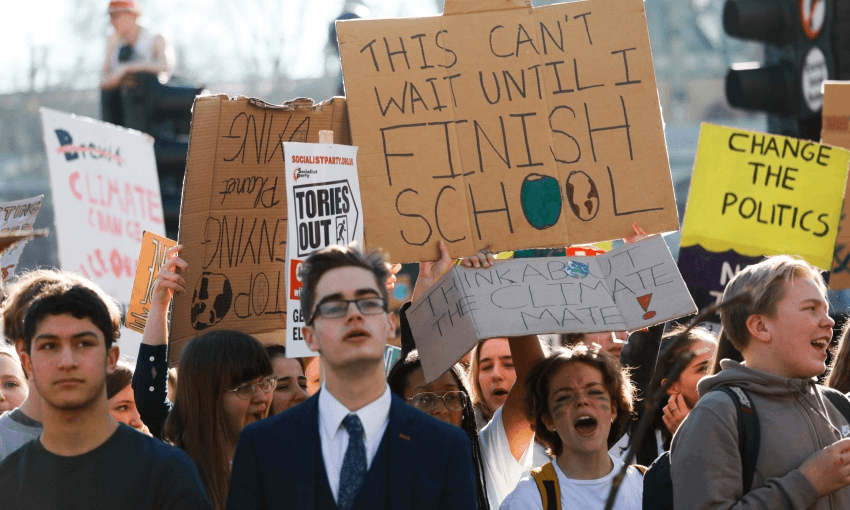How will schools respond to their students walking out on strike later in March? The actions of two Auckland schools show competing visions on how to deal with the activism, with one Principal coming out in full support, reports Alex Braae.
Schools are at odds with each other over how to respond to upcoming student strikes calling for action on climate change.
Strikes in more than 20 towns and cities around the country are planned for March 15, a Friday, with the Auckland event scheduled to take place in Aotea Square. While some schools are openly facilitating organisation, some schools are treating the impending strikes as unjustifiable absences, and have cracked down on efforts by students trying to organise.
A microcosm of this played out earlier this week, when a planning meeting scheduled by students from schools across Auckland had to be moved away from Auckland Girls Grammar, after the prestigious central city school got wind of the event.
AGG Deputy head girl Gwyneth Parallag, who is one of the leading organisers of the event, said the school staff were upset by the process she used to build awareness among students. She admits that she did “stir the pot” by sending out a mass, school-wide email advertising the strike without telling staff first, which went against school policy. “They pulled me up on that, and said no more school meetings and campaigning.” However, she says she was not formally reprimanded.
Parallag is a leader both inside and outside the school. She’s a youth MP, currently serves on the Papakura Youth Council, and is a top science student. Despite the school stopping the meeting from taking place on site, Parallag says she understands the position Auckland Girls Grammar is in, acknowledging that they “can’t be seen to be supporting it.”
However, she believes that the cause, and the method the students have chosen to express themselves, is too important to back down from. “One of the suggestions lots of teachers have been saying – why can’t we just have it on the weekend? Well, what are we risking on the weekend? Having a strike during the week, we’re risking our education. But history advances with risk.”
Auckland Girls Grammar did not respond to requests for comment.
Other students spoken to by The Spinoff said they didn’t want to name the schools they were coming from, for fear of provoking a reaction. A student from a separate girls school said there was something of a tacit ceasefire between students and staff over the strike.
“We have to keep it on the downlow, because if they’re confronted with it they’ll have to crack down on it,” said the year 13 girl, who also holds a student leadership position.
The planning meeting did subsequently go ahead, at Western Springs College. Students attended from as far afield as Manurewa to the North Shore. The Spinoff counted around 25 students in attendance, with the meeting involving about an hour of discussions on promotional strategies and allocation of roles.
Luke Wijohn, a year 13 at Western Springs, said it was his understanding that the school wasn’t condoning the protest, but that there was quiet support among staff.
However, WSC Principal Ivan Davis completely demolished that notion, saying that in fact the students had his full support to organise. He says he made the classroom available for the student meeting to take place in, “on the basis that they had been banned from doing that at another school.”
“My stance is the same as the one the prime minister outlined at the start of her term – that it is this generation’s nuclear free moment. The passion behind the students grasping onto this is really admirable.”
He added that rather than treating it as unjustified absence, he saw it as part of educating students about how protest could change the world. “It would be naive for anybody to say we forbid you to do this, because students are going to make a stand. For heaven’s sake, it’s one day.”
“I haven’t told the students yet, because I don’t feel I have to. But if there were just 25 of them or something, the impact will be minimal and they’ll be seen as a joke. Taking a stand like this needs organisation, leadership and passion,” he added. “I think the young people I know organising this have that passion.”
A report on Radio NZ indicated that some schools were considering offering support for the strikes, on the condition that students wrote an essay about the event afterwards.
The school strikes have gathered momentum around the world, in the wake of an alarming IPCC report calling for urgent action on climate change. The report warned that the world has little more than a decade to rapidly decarbonise, or warming would reach levels that would devastate the planet.
Strikes have taken place in hundreds of cities and dozens of countries, and frequently provoked a a generational backlash from older, more conservative elements of society.
Notably, Australian PM Scott Morrison who has frequently been accused of leading a government engaged in climate change denial, condemned the strikes in his country, saying there should be “less activism in schools”.
